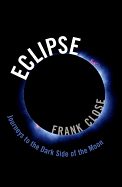
Theoretical physicist Frank Close (The Particle Odyssey) chases a natural phenomenon that has haunted humankind since time immemorial in his enlightening science memoir Eclipse: Journeys to the Dark Side of the Moon.
Close is a professor of physics at Oxford University and former head of the theoretical physics division at Rutherford Appleton Laboratory. Despite his hefty credentials, he eschews overly technical scientific jargon for a down-to-earth, lyrical account of solar eclipses, centering on his trips to Africa, the South Pacific and other locales where he pursues, with a mix of intrepid zest and mathematical precision, total solar eclipses. Eclipse beautifully blends these travel narratives with the history of eclipses, not only in science and math but also in art and literature, specifically how they've been represented as supernatural portents. At the same time, Close offers practical advice, such as when to look away from an eclipse, giving his book the feel of an intimate field guide.
But the best thing about Eclipse is neither its practical advice nor its scientific erudition. What stands out is Close's lean lyricism that elevates the material into a work of love. "A circle of profound blackness, a veritable hole in the sky," he writes with genuine awe, "was surrounded by shimmering white light." Adding a nice human touch to the material, Close reminisces about a childhood teacher who first inspired in him the wonder of scientific curiosity. Tracing this early love of stars and planets to his present-day cadre of eclipse chasers--"an international cult whose members worship the death and rebirth of the sun"--Close reveals the abiding passion that makes scientific discovery possible in the first place. --Scott Neuffer, freelance journalist, poet and fiction author.

